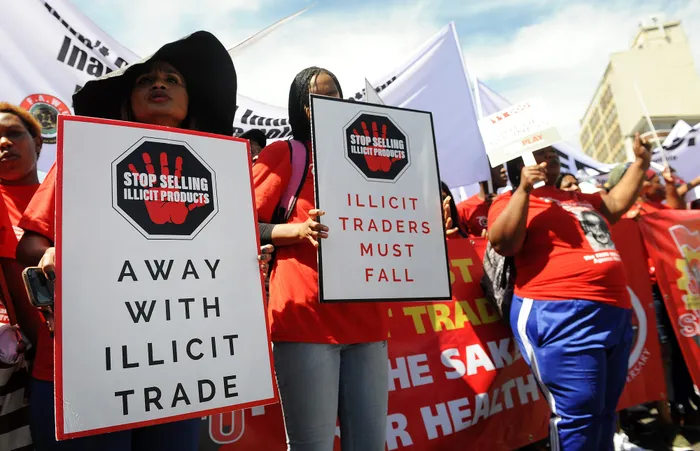
Transnational Alliance to Combat Illicit Trade (TRACIT) has asked the government to make illicit trade a deterrent.
Image: David Ritchie / Independent Newspapers
Government has been urged to strengthen criminal penalties and appoint an Interagency Anti-Illicit Trade Coordinator in conjunction with the private sector to battle illicit trade.
The South Africa Illicit Economy 2.0 Report, launched by the Transnational Alliance to Combat Illicit Trade (TRACIT) in conjunction with Business Unity South Africa (Busa) found that illicit activities have been undermining businesses, depleting tax revenues, undermining international trade, and exacerbating social and economic inequalities.
The South African Revenue Service estimates that illicit trade costs the country’s economy R100 billion annually.
In terms of lost tax revenues, Business Leadership South Africa estimated that South Africa loses around R250 million a day.
TRACIT director of programmes, Estaban Giudici, said government must prioritise efforts to combat illicit trade and the underlying conditions that facilitate it.
“Left unaddressed, illicit trade and its associated criminal activities will continue to rob the government of essential tax revenue and deter investments in the country,” said Giudici.
According to the report, the persistence and growth of illicit trade in South Africa are fuelled by systemic enablers that undermine enforcement and foster an environment conducive to illegal activities.
Organised crime, corruption, and structural weaknesses remain key drivers, with the lingering impacts of the Covid-19 pandemic compounding the challenges.
TRACIT director-general, Jeffery Hardy, said: “The Covid-19 pandemic provided ample opportunities for illicit traders to adjust and expand their operations during a time when government-imposed lockdowns, bans, and other restrictions disrupted legal markets and created shortages.
“For South Africa to restart and grow its economy, it must formulate policies and implement programs that deter and preclude illicit traders from consolidating roots in the post-pandemic economy.”
The report stated that illicit traders in South Africa exploit vulnerabilities throughout supply chain networks to facilitate illegal commerce. These supply chains vary significantly, from maritime shipping routes and free trade zones to postal and courier services, as well as online marketplaces.
South Africa’s weak performance in the e-commerce protection frameworks indicator of the TRACIT 2025 Illicit Trade Index underscores significant gaps in consumer protection and platform accountability. Key deficiencies include inadequate regulations establishing platform liability for third-party illicit sales, insufficient transparency measures such as seller verification, limited proactive risk management by online marketplaces, and weak consumer recourse mechanisms.
According to the report, the rapid expansion of e-commerce platforms has created fertile ground for illicit trade, particularly in emerging categories such as electronic cigarettes, heated tobacco products, and pharmaceuticals.
It added that existing frameworks, including the Medicines and Related Substances Act, have not sufficiently evolved to address digital commerce, resulting in critical vulnerabilities.
Online and informal digital marketplaces frequently facilitate counterfeit medicines and other unregulated products, posing severe health and safety risks due to unverified quality and efficacy.
The report also suggested that a strong government commitment to securing parcel delivery infrastructure is essential to prevent criminal exploitation and the trafficking of illegal goods through global postal networks.
TRACIT added that enforcement agencies often lack the technical expertise and tools required to detect and respond to illicit flows, particularly in industries where goods are easy to smuggle, conceal, or duplicate.
“For example, tobacco products remain a primary concern. Their small size, durability, ease of transport, and especially high profit margins make them a favourite among smugglers. Similarly, counterfeit pharmaceuticals, substandard alcohol, and falsified consumer goods also continue to flood informal markets, driven by weak regulation, high demand, and gaps in enforcement,” reads the report.
The report stated that illicit cigarettes currently account for nearly 60% of the South African market. It added that the illicit share has grown significantly, starting at 5% in 2009, peaking at 60% in 2021, and slightly declining to 58% in 2022.
“That same year, the government lost an estimated R18 billion in revenue — R15 billion in excise duties and R3 billion in VAT. Over the 20 years from 2002 to 2022, cumulative losses in excise and VAT revenue amounted to R119 billion (adjusted to 2022 prices).”
Hardy added that South Africa stands at a crossroads, and now is the time for bold policies and strong enforcement to dismantle illicit networks.
“That’s why this year we’ve gone a step further and proposed a structured Public-Private Partnership to support South African and regional authorities in their fight against illicit trade,” he said.
Cape Times
Related Topics: